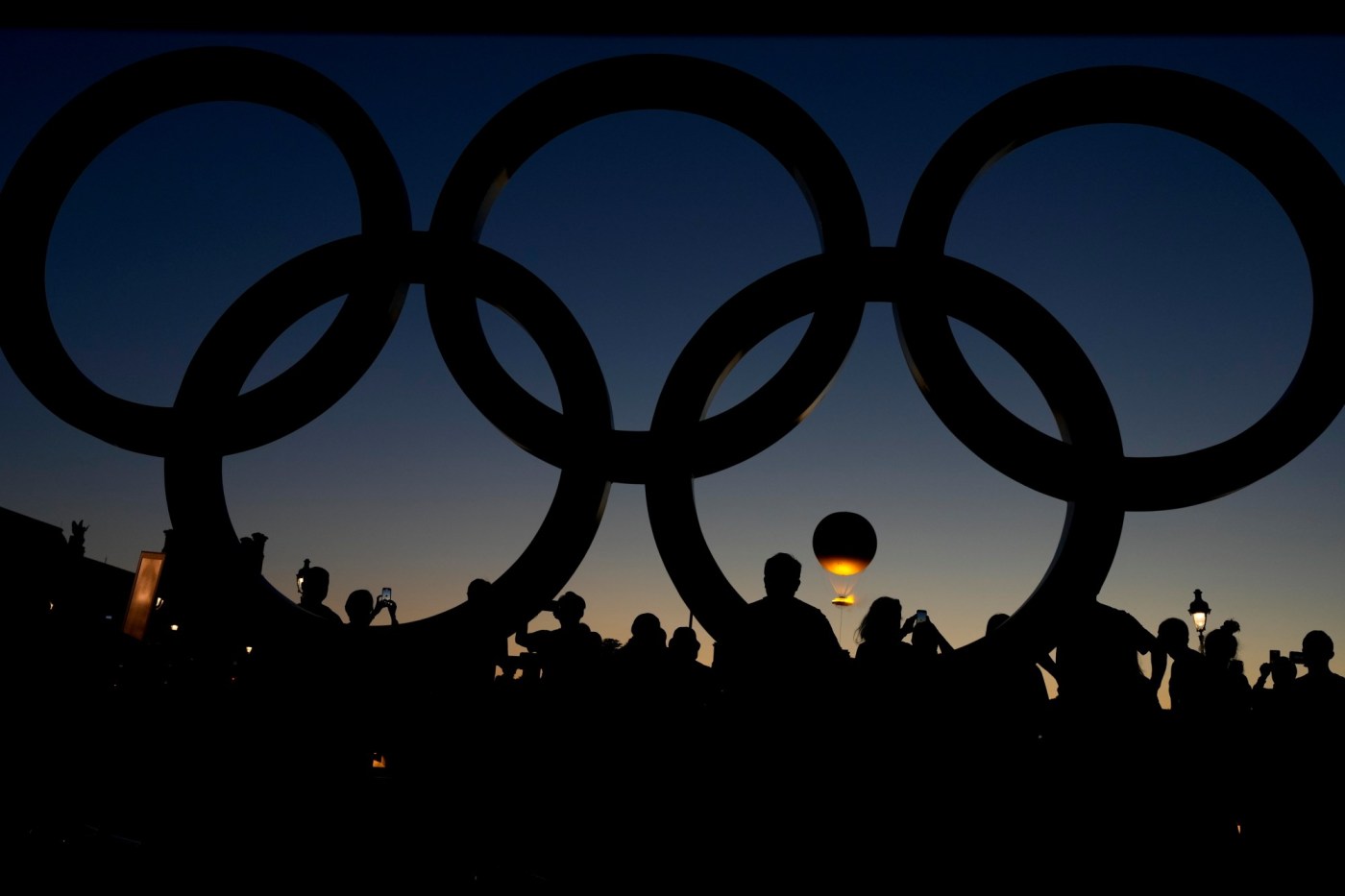PARIS – First, a big thank you to the French for going on vacation and leaving Paris to us, like an Airbnb without a security deposit.
Parisians considered the specter of packed Metros, terrorism, crowds, random acts of Ugly Americanism, and headed for the Cote d’Azur or the Alps. The result was an eerie scene out of a dystopian novel: one of the world’s leading cities completely devoid of locals, other than the spare cook or waiter to run the restaurants.
Otherwise, deserted. There genuinely might have been more Americans here than French.
Related Articles
Photos: Paris closes out the 2024 Olympics with a final star-studded show
Photos: Team USA’s gold in women’s basketball among highlights of Paris Olympics’ final day
Paris closes the Olympics, and LA turns to Tom Cruise for its 2028 mission
US women edge France in a thriller to win eighth straight Olympic basketball gold medal
Missing out on Lauri Markkanen wasn’t a mistake by the Warriors
But these Olympics worked nonetheless at a time when the Olympic movement needed them to work. They were safe. They were accessible. The backdrops were spectacular.
Fencing inside the Grand Palais. Equestrian at Versailles. Skateboarding next to the Luxor Obelisk. Beach volleyball beneath the Eiffel Tower.
“My first couple matches, stepping onto the court with 12,000 people cheering, it was just an incredible atmosphere,” said Chase Budinger, the La Costa Canyon High School alum who knows a bit about incredible atmospheres, spending eight seasons in the NBA. “Playing at night made it even more special, playing under the lights and the Eiffel Tower was sparkling.
“Like, you can’t replicate these types of memories.”
But the real reason these Olympics worked was because they won’t sink the French economy, like the Athens Games did in Greece two decades ago. They operated on a more fiscally responsible model, not building white elephant stadiums that are obsolete the moment the flame is extinguished, not trying to impress anybody. These were the Summer Games in the City of Light, and the City of Lite.
Most venues were temporary metal bleachers on scaffolding that vertiginously swayed when people stood to cheer, and that will be dismantled as soon as the Paralympics are finished. Concession stands were bare bones. Flag poles for medal ceremonies were plastic. The workforce was predominantly unpaid volunteers. Media services were noticeably pared back from previous Games.
The new blueprint: Exclusively use temporary or existing venues, add more bizarre sports to provide more television and ticket inventory, enlist 40,000 volunteers to work for free, then charge exorbitant prices for events that people would never, ever pay to see except so they can say they went to the Olympics. (And even then, given the enormous costs associated with hosting the Games, you still might not stay in the black.)
Expect more of the same in 2028 in Los Angeles, which has already been slashing the budget as the inevitable cost overruns mount.
One item: the Paris closing ceremony Sunday.
The next host city is traditionally granted a time slot toward the end of closing ceremony to give the world a sneak preview of what’s to come, to make a good first impression. In Beijing in 2008, London flew over a modified double-decker bus that David Beckham popped out of and kicked soccer balls while Led Zeppelin guitarist Jimmy Page wailed away.
The Los Angeles segment Sunday started spectacularly, with Tom Cruise doing his own stunt work, gliding down on cables from the roof of Stade de France, receiving the Olympic flag from Simone Biles and then riding out with it on a motorcycle.
They must have run out of money there, because the rest was merely aired on smallish video boards at either end of Stade de France and not performed in person. It consisted of videos of three staged musical acts at a Southern California beach: the Red Hot Chili Peppers, Billie Eilish and rapper Snoop Dogg, who, thanks to his work with NBC the past two weeks, suddenly has become synonymous with the Olympics.
As the video aired, unimpressed athletes streamed for the Stade de France exits.
That followed an elegant, ethereal farewell as only the French can, with the stadium lights dimmed and white-clad dancers surrounding five circles. They eventually hoisted them on their sides and wheeled them to cables that lifted them into the air. One by one, they rose into the sultry Paris night until majestically forming the interlocking rings as fireworks exploded above them.
The bar has been set high. The choice for Los Angeles: try to jump over it, or just limbo beneath.
Here’s a look at the winners and losers of the past 17 days:
Winners
United States’ Coco Gauff and Lebron James travel along the Seine River in Paris, France, during the opening ceremony of the 2024 Summer Olympics, Friday, July 26, 2024. (AP Photo/Ashley Landis,Pool)
The Seine
Athletes’ processions at the Olympics opening ceremony are always cool. But on a flotilla of boats drifting down the Seine at twilight, under bridges, past historic landmarks, in the shadow of the Eiffel Tower? Next level. Said tennis player Taylor Fritz, who lost hundreds of rankings points by playing in Paris: “Just being at the front of the boat with (flagbearers Coco Gauff and LeBron James) while we were going down the river, that moment alone is worth the sacrifice of what I’m giving up to come here. I mean, I didn’t really realize it fully until that moment, where this is so cool, this is something I’ll never forget.”
Simone Biles of the United States competes on the balance beam during a women’s artistic gymnastics qualification round at the 2024 Summer Olympics, Sunday, July 28, 2024, in Paris, France. (AP Photo/Charlie Riedel)
Simone Biles
The female star of the Olympics with three golds and a silver. Women’s gymnastics at Bercy Arena became a magnet for A-list celebrities, and Biles cemented her legacy in what many expect to be her final Olympics. After winning the individual all-around gold eight years after her first, she slipped on a sparkling necklace of a farm animal: a goat. Or, more accurately, GOAT.
Léon Marchand
The male star of the Games with four swimming golds and a bronze. All four came in individual events, two in a single day that Michael Phelps called “probably the greatest double in the history of the sport.” Proof of the Frenchman’s popularity: There was an eruption from the crowd at a U.S. men’s basketball game that LeBron James assumed was for him, acknowledging it with a wave and pointing his thumbs at the name on the back of his jersey. Uh, sorry, LeBron, they were cheering for a swimmer. The video board had just shown Léon in the arena.
Golf
The sport’s return to the Olympic program in 2016 after a 108-year hiatus received a lukewarm reception from the multimillionaires on tour who wouldn’t be getting a paycheck. Then they played without fans in Japan. But golf turned an enormous corner here, with massive galleries and a loaded leaderboard that actually cared. Winner Scottie Scheffler cried on the medal podium. Rory McIlroy called it “probably one of the best individual competitions I’ve been a part of.” And a disconsolate Jon Rahm of Spain, after blowing a four-stroke lead on the back nine and didn’t medal, said: “I’ve gotten the question, where this tournament would rank … I think by losing today, I’m getting a much deeper appreciation of what this tournament means to me than if I had won any medal.”
SkateboardingThe sport continues its rapid upward trajectory, in much the same way that snowboarding’s halfpipe has in the Winter Olympics starting in 1998. It had a full stadium this time after making its debut in Tokyo under strict pandemic lockdowns, and the reviews were beyond positive. Now there’s a movement to add a vert ramp event to street and park in Los Angeles in 2028. “It’s been a long time coming,” skateboarding icon Tony Hawk said after a scintillating men’s park final in which San Diegans finished 1-2-5-6. “I think skateboarding should have been here back when they did snowboarding, but I’m just glad they finally figured it out.”
Japan
Quick question: After the United States (126) and China (91), who was next on the medal table? It was Japan with 20 gold medals and 45 total medals. That’s two straight Summer Games with the Japanese in the top three despite bringing 150 fewer athletes to France than in Tokyo. It was their best haul at an Olympics outside Japan and far exceeded one respected medals prognostication of 13 golds and seventh place overall. The Japanese also earned medals for the first time in 10 disciplines.
Women’s marathon gold medalist Sifan Hassan, of the Netherlands, waves on the podium during the 2024 Summer Olympics closing ceremony at the Stade de France, Sunday, Aug. 11, 2024, in Saint-Denis, France. (AP Photo/Natacha Pisarenko)
Sifan Hassan
How’s this for an Olympics? Gold in the women’s marathon on a sweltering Paris morning Sunday … after getting bronze in the 5,000 and 10,000 meters on the track. It’s as unprecedented as it’s unfathomable, given the toll on the feet that modern tracks, built purposely hard to facilitate sprint records, exact on distance runners. The gold medal was presented by International Olympic Committee President Thomas Bach during the closing ceremony, and the Ethiopian-born (and Muslim) Hassan, now representing the Netherlands, accepted it wearing a hijab — presumably a statement against the French headscarf ban among their Olympic athletes.
Losers
The Seine
It was fine for athletes on top of the river, just not in it. The French government spent $1.5 billion cleaning up the waterway that snakes through Paris, with ambitious plans to host the triathlon and marathon swim in it. Several practices and the men’s triathlon were postponed after poor water readings. Then came reports that the triathlon mixed relay was held with pollution levels above safety norms. “They didn’t think about the athletes at all,” triathlete Miriam Casillas told a Spanish newspaper. “They thought more about the scenery, the image, to make it look nice and marketable with the Seine.”
Australia’s Rachael Gunn, known as B-Girl Raygun, competes during the Round Robin Battle at the breaking competition at La Concorde Urban Park at the 2024 Summer Olympics, Friday, Aug. 9, 2024, in Paris, France. (AP Photo/Frank Franklin)
Breaking
It was already doomed, with Los Angeles declining to add it to the 2028 program after its 2024 debut. Breaking’s great hope was that people would see the competition for the first time and it would go viral, and it did. It just didn’t figure to be “Raygun,” a rhythmically challenged, 36-year-old university lecturer with a PhD in cultural studies representing Australia. She wore what looked like an Aussie cricket uniform and hat while doing the sprinkler and some sort of interpretive marsupial dance. Any chance the 2032 Summer Games in Brisbane, Australia, might revive it? Here’s some breaking news: Good luck with that.
Boxing
After the 2016 Olympics in Rio de Janeiro, an investigation uncovered rampant corruption among judges. Here we are eight years later, with another boxing fiasco. This centered around gender, with the former world governing body booting Algeria’s Imane Khelif and Taiwan’s Lin Yu-ting for allegedly failing gender tests that revealed they have Y chromosomes. The IOC, which organized the competition here, has different entry standards and let them fight, and they both won their respective weight divisions easily. One opponent walked out of the ring after 46 seconds. Two others formed their fingers into an X (to signify X chromosomes) after losing. Maybe the solution is to just ban boxing.
Christian Coleman, left, of the United States, struggles to hand the baton to teammate Kenneth Bednarek, in the men’s 4×100-meter relay final at the 2024 Summer Olympics, Friday, Aug. 9, 2024, in Saint-Denis, France. (AP Photo/Bernat Armangue)
4×100
For the fifth straight Olympics, the nation with all the fastest sprinters couldn’t get the baton around in the men’s 4×100-meter relay without a bungled pass. This time, it happened on the first exchange, when the lead runner ran past his teammate and finally transferred the baton out of the zone, an automatic disqualification. Then they walked into the interview area, shrugged and offered such philosophical explanations as: “It is what it is.” The rest of the world can’t stop laughing.
Canada
The reigning gold medalist in women’s soccer was so scared of its opener against New Zealand, which had won exactly two of 16 previous Olympics games, that a staffer sent up a spy drone to film the Kiwis’ practice. Then came reports suggesting that it was more than an isolated incident, that both Canada men’s and women’s teams had been regularly using spy drones for years. FIFA, soccer’s world governing body, docked Canada six points in the Olympic tournament and issued a one-year ban for head coach Bev Priestman, who resigned. The rudderless team was ultimately eliminated in the quarterfinals and slinked home.
U.S. men’s swimming
The Paris pool was criticized for being slow, but maybe it was the athletes swimming in it. At least that was the case with the U.S. men, who went from five and six gold medals in the previous two Olympics to just one, a world-record performance by Bobby Finke in the 1,500-meter freestyle. This is a problem, particularly with swimming moving to the back half of the 2028 Games while track and gymnastics battle for attention in the first week. Maybe Americans can cheer for Marchand.
Anti-doping
An Iraqi men’s judoka and Nigerian women’s boxer were both popped in out-of-competition tests and banned from the Olympics before they competed. That’s it. That’s all the positive tests at a global competition with 10,714 athletes from more than 200 countries. Which means: Either no one is cheating anymore, or the anti-doping movement has lost the battle. And even when it does get positive tests, as with 23 Chinese swimmers, the World Anti-Doping Association looks the other way and lets them compete (and, in some cases, win medals). Let’s go with lost the battle.












